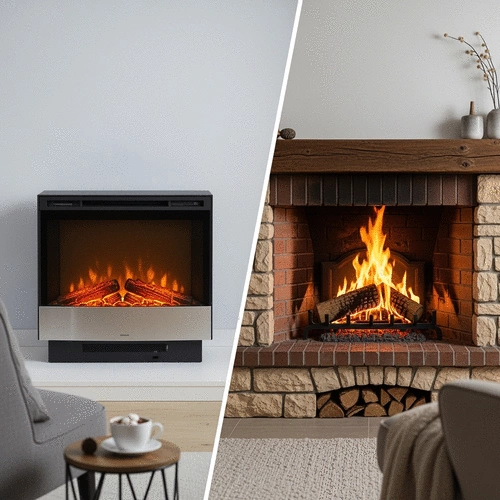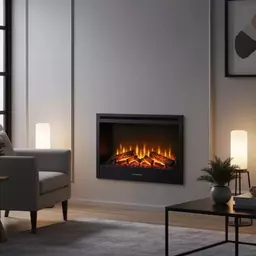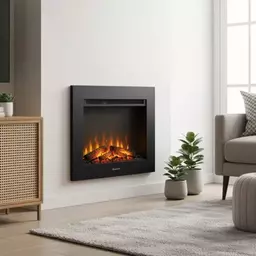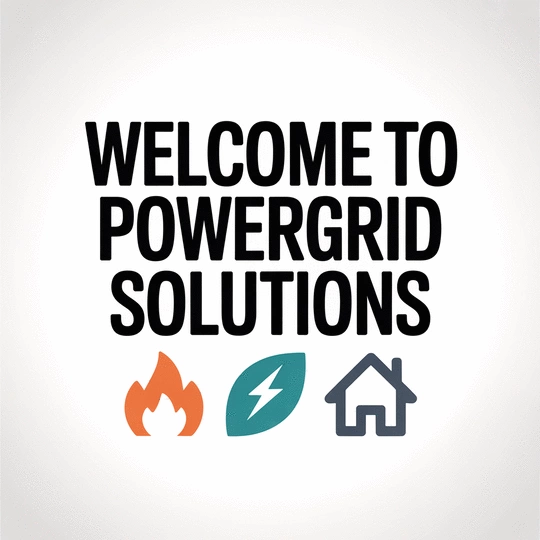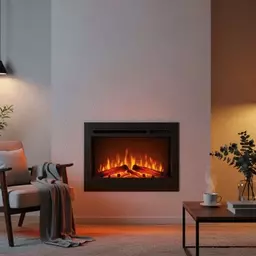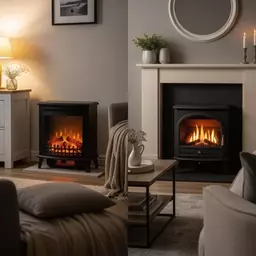Have you ever wondered how your choice of fireplace can impact both your energy bills and the environment? The decision between electric and traditional fireplaces involves more than just aesthetics; understanding energy efficiency and costs is crucial to making the right choice.
What You Will Learn
- Energy Efficiency: Electric fireplaces convert nearly all the electricity they use into heat, boasting efficiency ratings up to 99%, far surpassing traditional options.
- Cost Effectiveness: While electric fireplaces often have lower upfront costs, their energy-saving capabilities can lead to significant long-term savings on energy bills and maintenance.
- Environmental Impact: Electric models typically have a smaller carbon footprint, especially when using renewable energy sources, making them a greener choice.
- Heating Flexibility: Electric fireplaces offer versatile settings, allowing control over heat output without excess energy wastage, making them adaptable to your needs.
Energy Efficiency and Cost Comparison of Electric vs Traditional Fireplaces
Understanding the differences in energy efficiency and costs associated with electric and traditional fireplaces can guide you in making an informed choice. Below is a visual comparison highlighting key aspects of both types. If you're looking for an in-depth guide on choosing an electric fireplace, this resource can further assist your decision-making.
Energy Efficiency
Electric fireplaces have an efficiency rating of around 99%, converting almost all energy into heat. Traditional fireplaces often lose heat through the chimney, resulting in lower efficiency.
Cost Considerations
- Upfront Costs: Electric fireplaces generally require lower initial investment.
- Maintenance Costs: Electric models incur little to no maintenance, while traditional fireplaces may require higher upkeep.
- Energy Savings: Over time, electric fireplaces can lead to significant savings on energy bills due to higher efficiency.
Environmental Impact
Electric fireplaces typically have a smaller carbon footprint, especially when powered by renewable energy sources.
Heating Flexibility
Electric fireplaces offer various modes, including a flame-only option, allowing for customized comfort without excessive energy use.
Understanding Energy Costs: Electric vs Traditional Fireplaces
When it comes to choosing between electric and traditional fireplaces, understanding energy costs is key! Let’s dive into some important terms that will help unravel this topic and make it more approachable. For starters, you might hear terms like kilowatt-hours (kWh), BTU, and wattage. Each of these plays a role in determining how much energy your fireplace consumes and ultimately affects your bills.
Kilowatt-hours measure the amount of energy you use, while BTUs (British Thermal Units) indicate the heat output of your fireplace. Wattage helps gauge how much electricity a fireplace uses per hour. So, when you’re comparing options, keep these metrics in mind—they can really shine a light on the efficiency of different types of fireplaces!
Defining the Energy Consumption Metrics
Understanding energy consumption metrics can feel overwhelming at first, but I promise it’s easier than it sounds! Here’s a quick rundown of the essential terms:
- Kilowatt-hours (kWh): The standard unit of measurement for electricity. It equals consuming 1,000 watts for one hour.
- BTU (British Thermal Unit): A way to measure heat output; one BTU raises the temperature of one pound of water by one degree Fahrenheit.
- Wattage: Indicates how much electricity an appliance uses; the higher the wattage, the more energy it consumes.
These metrics are crucial when evaluating the energy efficiency of your fireplace. For instance, electric fireplaces usually convert nearly all of their energy into heat, making them a great choice for those looking to save on energy costs while enjoying a warm and cozy space. To learn more about how they stand out, consider exploring energy-efficient electric fireplaces.
Examining the Energy Efficiency of Electric Fireplaces
Now that we’ve covered the basics, let’s talk about the energy efficiency of electric fireplaces. One of the best things about these modern heating solutions is their ability to convert almost all the energy they use into heat. In fact, electric models can boast efficiency ratings of around 99%! This means minimal energy is wasted, making it a smart choice for budget-conscious homeowners.
In contrast, traditional wood or gas fireplaces often have lower efficiency rates due to heat loss through the chimney and other factors. If energy savings are a priority for you, electric fireplaces can definitely be the way to go! Plus, with the convenience of adjustable settings, you can easily control the amount of heat being produced without worrying about excessive energy use.
Electric Fireplaces vs Traditional Fireplaces: A Cost Comparison
Let’s get practical—what does it really cost to own and operate these fireplaces? Here’s a quick comparison of the various costs associated with electric and traditional options:
- Upfront Costs: Electric fireplaces generally have lower upfront costs compared to traditional fireplaces, as there's no need for venting or extensive installation.
- Maintenance Costs: Electric models require little to no maintenance, while traditional fireplaces may incur significant upkeep expenses.
- Energy Savings: Over time, the energy efficiency of electric fireplaces can lead to substantial savings on energy bills compared to wood or gas alternatives.
By weighing these costs, you can make an informed decision that best fits your financial situation and lifestyle. In my experience at PowerGrid Solutions, I’ve seen many Australians opt for electric fireplaces due to their cost-effectiveness and ease of use! If you're looking for a stylish way to heat your home without breaking the bank, electric fireplaces are definitely worth considering.
Quick Summary
Here's a brief recap of the key points discussed so far:
- Energy Consumption Metrics: Understanding kWh, BTU, and wattage is essential for evaluating fireplace efficiency.
- Energy Efficiency: Electric fireplaces offer nearly 99% efficiency, significantly reducing energy waste compared to traditional options.
- Cost Comparison: Electric fireplaces generally have lower upfront and maintenance costs, leading to long-term savings.
- Environmental Considerations: Electric models tend to have a smaller carbon footprint, especially when using renewable energy sources.
Key Takeaways on Energy Costs and Heating Efficiency
As we wrap up our discussion on energy costs and heating efficiency, let's quickly revisit the essential points. Understanding how electric fireplaces compare to traditional options can empower you to make informed decisions. Here’s what I found to be the most crucial highlights:
- Energy Efficiency: Electric fireplaces convert nearly all energy into heat, making them a highly efficient choice compared to gas and wood options.
- Cost Effectiveness: While electric fireplaces often have lower upfront costs, the savings in maintenance and energy bills can be significant.
- Environmental Impact: Electric models generally have a smaller carbon footprint, especially when powered by renewable energy sources.
- Heating Flexibility: They offer various modes, from flame-only to heat mode, allowing you to customize your comfort without wasting energy.
These insights can help you evaluate what heating solution aligns best with your lifestyle and home environment. I believe that by weighing these factors, you can make the best choice for your space!
Frequently Asked Questions About Fireplace Energy Efficiency
- Q: How do electric fireplaces achieve 99% energy efficiency?
- A: Electric fireplaces convert almost all the electricity they consume directly into heat, with minimal energy loss, unlike traditional fireplaces where a significant portion of heat escapes through a chimney.
- Q: Are electric fireplaces cheaper to operate than traditional ones?
- A: While electricity costs vary, electric fireplaces generally have lower operating costs due to their high efficiency and lack of need for fuel like wood or gas. They also have minimal maintenance expenses.
- Q: What are kWh, BTU, and wattage, and why are they important for understanding fireplace energy consumption?
- A: kWh (kilowatt-hours) measures electricity usage, BTU (British Thermal Unit) measures heat output, and wattage indicates instantaneous power consumption. Understanding these metrics helps you assess how much energy a fireplace uses and its heating capacity.
- Q: Do electric fireplaces have a smaller environmental impact?
- A: Yes, electric fireplaces typically have a smaller carbon footprint, especially when the electricity they use comes from renewable energy sources. They produce no direct emissions like smoke or soot.
- Q: Can electric fireplaces heat a whole room?
- A: Electric fireplaces are effective for zone heating, meaning they can efficiently heat the specific room they are in. For larger or open-plan areas, they may need to be supplemented by other heating systems.
Encouragement for Informed Fireplace Choices
Choosing between an electric fireplace and a traditional one can feel overwhelming, but it doesn't have to be! At PowerGrid Solutions, our mission is to provide you with reliable knowledge to guide your decision-making. Remember that understanding energy costs and efficiency is vital for making an informed choice that suits your needs. Here are a few things to consider as you decide:
- Your Lifestyle: Do you prefer low-maintenance options? Electric fireplaces require less upkeep!
- Home Design: Consider how each type will fit into your overall decor and heating needs.
- Energy Usage: Think about how often you will use the fireplace and the associated costs.
- Environmental Values: If sustainability is important to you, electric fireplaces may be the better option.
By considering these factors, you can select a fireplace that not only warms your home but also fits your values and lifestyle. So, as you embark on this journey, keep your specific needs and preferences front and center. I can’t wait for you to discover the cozy ambiance that electric fireplaces can bring to your space! For more considerations, check out our insights on energy-efficient electric fireplaces guide.
Recap of Key Points
Here is a quick recap of the important points discussed in the article:
- Energy Efficiency: Electric fireplaces convert nearly all energy into heat, making them highly efficient compared to gas and wood alternatives.
- Cost Effectiveness: Electric fireplaces usually have lower upfront costs and offer significant savings on maintenance and energy bills over time.
- Environmental Impact: Electric models typically have a smaller carbon footprint, especially when powered by renewable energy sources.
- Heating Flexibility: They provide various modes, allowing customization of comfort without excessive energy use.
- Consider Your Lifestyle: Evaluate maintenance, home design, energy usage, and environmental values when choosing between electric and traditional fireplaces.

